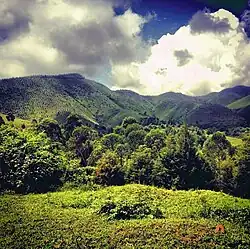2°53′18″S 28°34′23″E / 2.88833°S 28.57306°E
Kilungutwe | |
|---|---|
 The lush, emerald-green hills enveloping Kilungutwe, January 2014 | |
| Country | |
| Province | South Kivu |
| Territory | Mwenga |
| Chiefdom | Luindi |
| Time zone | UTC+2 (CAT) |
Kilungutwe is a small village in the Luindi Chiefdom, located in the valley of the Kilungutwe River in the Mwenga Territory of the South Kivu Province. Situated in the eastern part of the Democratic Republic of the Congo (DRC), Kilungutwe is positioned nearby neighboring villages of Kirukungutu and Chowe.[1] The region is a melting pot for many ethnic groups, boasting a diverse ethnocultural landscape. It is also a point of confluence for numerous ethnic groups, including the Lega, Nyindu, Shi, Fuliiru, Holoholo, Bwari, Vira, Hunde, Nyanga, Bembe, and Amba people.[2][3][4]
Kilungutwe has been the site of violence for nearly three decades due to its proximity along the route to a nearby gold mine. In the First and Second Congo Wars, the region experienced a surge in armed conflicts that resulted in displacement, loss of lives, and property damage.[5][6][7][8][9]
History
According to Belgian anthropologist Daniel P. Biebuyck, the Mwenga Territory has conventionally been inhabited by the Lega people.[10][11] However, the area also accommodated diverse ethnic groups, including the Nyindu, Shi, Fuliiru, Bembe, Zimba, Vira, Kumu, and Songora people.[12][13][14]
Security problems
Like many regions in the South Kivu Province, Kilungutwe has been embroiled in a complex and protracted conflict since the First Congo War, which resulted in widespread displacement, human rights abuses, and loss of life.[8][7][15]
Kasika massacre
On August 24, 1998, amid the Kasika massacre, Kilungutwe was attacked by the Rwanda-sponsored armed forces Rally for Congolese Democracy (Rassemblement Congolais pour la Démocratie; RCD).[16][17][18][19] The attack resulted in a massacre of over 43 civilians, many of whom were women and children.[20][21][22] The RCD forces callously throw the corpses of their victims into common graves, pit latrines, and even the Kilungutwe River.[21][23]
See also
References
- ↑ "Mwenga : pourparlers FARDC et FDLR". Radio Okapi (in French). 2007-11-20. Retrieved 2023-05-09.
- ↑ "RDC: 22 ans après le massacre de Kasika, Denis Mukwege réclame réparation pour les victimes". Actualite.cd (in French). 2020-08-25. Retrieved 2023-05-09.
- ↑ Verweijen, Judith; Brabant, Justine (2017). "Cows and guns. Cattle-related conflict and armed violence in Fizi and Itombwe, eastern DR Congo". The Journal of Modern African Studies. 55 (1): 1–27. doi:10.1017/S0022278X16000823. ISSN 0022-278X. JSTOR 26309798. S2CID 64607292.
- ↑ Gamaidandi, Douswe (2021-11-17). "WATER-ENERGY-FOOD NEXUS RESEARCH: ASSESSMENT OF HOUSEHOLD INDICATORS IN DRC".
{{cite journal}}: Cite journal requires|journal=(help) - ↑ "Sud-Kivu : vols, viols et pillages à Kilungutwe". Radio Okapi (in French). 2006-01-17. Retrieved 2023-05-09.
- ↑ "Life for women in the country that 'never turned the page of conflict'". The Independent. 2019-06-12. Retrieved 2023-05-09.
- 1 2 "Mwenga : les attaques des FLR entraînent d'importants mouvements de populations". Radio Okapi (in French). 2009-06-02. Retrieved 2023-05-09.
- 1 2 "Mwenga : encore des attaques et des pillages, signé FDLR". Radio Okapi (in French). 2009-06-01. Retrieved 2023-05-09.
- ↑ "RDC : Martin Fayulu exige l'expulsion de l'ambassadeur du Rwanda, Vincent Karega". 7sur7.cd (in French). 2020-08-27. Retrieved 2023-05-09.
- ↑ Biebuyck, Daniel P. (2002). Lega: Ethics and Beauty in the Heart of Africa (in English and French). KBC Banking & Insurance. ISBN 9789053493861.
- ↑ Biebuyck, Daniel P. (1987). The Arts of Central Africa: An Annotated Bibliography. Boston, Massachusetts: G.K. Hall. ISBN 9780816186013.
- ↑ Biebuyck, Daniel P. (1973). Lega Culture; Art, Initiation, and Moral Philosophy Among a Central African People. Berkeley, California: University of California Press. pp. 3–7. ISBN 9780520020856.
- ↑ Biebuyck, Daniel P. (1985). The Arts of Zaire: Southwestern Zaire. Berkeley, California: University of California Press.
- ↑ Biebuyck, Daniel P. (1982). Statuary from the Pre-Bembe Hunters: Issues in the Interpretation of Ancestral Figurines Ascribed to the Basikasingo-Bembe-Boyo (in English, French, and Dutch). Tervuren, Belgium: Royal Museum of Central Afrika.
- ↑ "Plus de 200 déplacés recensés à Bukavu". Radio Okapi (in French). 2006-01-25. Retrieved 2023-05-09.
- ↑ Bulambo, Didier Mwati (2010). République Démocratique du Congo: 13 ans sous la main du diable : de l'AFDL de L.D. Kabila au CNDP de Nkundabatware (in French). Paris, France: Edilivre Aparis. p. 116. ISBN 9782353354658.
- ↑ Foroyaa: Organ of the People's Democratic Organization for Independence and Socialism, Issues 1-46. Serrekunda, Gambia: PDOIS' Editorial Board. 1999.
- ↑ Reyntjens, Filip (2001). "Briefing: The Democratic Republic of Congo, from Kabila to Kabila". African Affairs. 100 (399): 311–317. doi:10.1093/afraf/100.399.311. ISSN 0001-9909. JSTOR 3518770.
- ↑ Gouby, Mélanie (4 July 2022). "The Rebirth of Congo's Rebellion". Foreign Policy. Retrieved 2023-05-09.
- ↑ "Democratic Republic of Congo: War against unarmed civilians" (PDF). Amnesty International. London, United Kingdom. November 23, 1998. pp. 13–15. Retrieved 2023-07-06.
- 1 2 Human Rights Ministry, Democratic Republic of Congo (2001). The War of Aggression Against the Democratic Republic of Congo: Three Years of Massacres and Genocide "in Camera". Kinshasa, Democratic Republic of the Congo. pp. 12–14.
{{cite book}}: CS1 maint: location missing publisher (link) - ↑ U.S. Government Printing Office (2001). Suffering and Despair. Humanitarian Crisis in the Congo: Hearing Before the Subcommittee on International Operations and Human Rights of the Committee on International Relations, House of Representatives, One Hundred Seventh Congress, First Session, May 17, 2001, Volume 4. Washington, D.C. p. 17. ISBN 9780160659812.
{{cite book}}: CS1 maint: location missing publisher (link) - ↑ "CASUALTIES OF WAR". archive.hrw.org. Retrieved 2023-05-09.